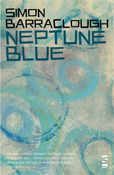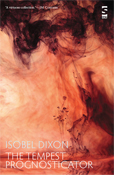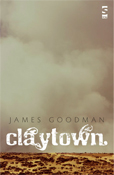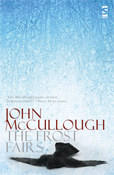
Neptune Blue
by Simon Barraclough

The Tempest Prognosticator
by Isobel Dixon

Egg Printing Explained
by Katy Evans-Bush

Claytown
by James Goodman

The Frost Fairs
by John McCullough
Annual Salary: A Salt Round-Up
Salt Publishing has had a good year and deservedly so. At a time when the major publishers' lists remain largely unchanging (and ever-ageing), Chris Hamilton-Emery's lot have been soaking up much of the mainstream talent, and keeping a hand in the non-mainstream as well. The following 200-word reviews cover but a handful of the year's releases.
Simon Barraclough's Neptune Blue reads like a sequence of teaser trailers, with a hearty dose of main feature. Barraclough writes with the energy and playfulness of someone for whom poetry can continually, and must, be re-invigorated and re-examined in terms of what it can do. Springing from unabashed nerdyness ('Flashbacks of a Fool') to pastiche ('Examination at Doom's Door' splicing Ted Hughes and computer games) with no signs of tiredness, he then lingers on a sequence dedicated to the planets, imagining the unknown and juggling puns and references throughout.
The 'Heart' sequence pops up throughout the book like a shadowy or comic character, taking us from Russian director to chewing gum in a few bounds, pivoting merrily around one pulsing point. Some of these are awesomely ludic vignettes, while others feel a little more throwaway. I imagine it's hard to decide how and when to edit Barraclough so as not to lose the spring in his step, but his work is delivered so winningly that often it can rampage straight through a list of classic poetic Don'ts and you go along with it anyway. Even the notes are like excited recommendations and invitations designed to set you thinking and investigating.
In 'Incorrigibly Plural', Simon Barraclough fires off reams of marketing slogans and customer promises from a future world where snowflakes are privatised. It's a natural fit for his style of writing, which carries something of the flavour of advertising copy – clean, approachable, trimmed of fat, shorn of the ornate and over-elaborate. The two main sequences in this collection – one on the planets, the other conjuring up different species of heart ('Pizza Heart', 'Anti-personnel Heart' et cetera) – are light as souffle without resorting to Wendy-Cope-esque dittyism or the dreaded one-liner. His many conceits, likewise, are joyously simple to grasp: Ted Hughes burlesqued via Id's Doom; misheard lyrics to 'Lord of the Dance'; a movie set romance remembered through a haze of special effects.
Barraclough takes inspiration from sculpture, history, literature and – in particular – film, but always adds his own imaginative, irreverent twist. It might be said that this is all too obvious and easy, that in avoiding anything too emotionally or linguistically messy the poet steers clear of risk-taking. But in truth, it's hard not to regard the persistent clearheadedness of these poems as a strength.
By turns delicate, descriptive, probing and tongue-in-cheek, Isobel Dixon's The Tempest Prognosticator brings familiarity to the alien and freshness to the known. Animals and people are viewed through half-glimpses, documentary-style examination and tall tales.
Particularly magical is 'You, Me and the Orangutan', an imagined fling with a handsome ape. What could have ended up as a dirty joke in other hands becomes a homage to the enchanted bestiality of fairytales, the narrator straight-lacedly describing lying, "burning, on our bed", thinking of her lover's homeland and origins.
Dixon's controlled erotic teasing pops up again in 'Beetle, Fish and Fetish', her tribute to pioneering travel writer Mary Kingsley, where the protagonist encounters "a strapping chap of wolf's-mouth black". Curiosity makes this collection both sophisticated in its detail and somewhat feral.
As meticulous as she is elsewhere in this collection, I can't help wishing Isobel Dixon had gone the whole hog on a bestiary book. The animal poems that make up a sizeable portion of The Tempest Prognosticator are weird, sweet, memorable and unsettling, spiced with the exotic and erotic. If pop music comparisons aren't too gauche, 'You, Me and the Orang-utan' reminds me of Kate Bush sensuously seducing her snowman or computer:
"Believe me, though, it's not a question of size –
what did it for me were his supple lips, those melancholy eyes."
The sexual undertones are more subtle in other poems, but never quite fade away. 'Shabby ballerina' struzzi flutter their lashes, peacocks with 'bristling crests' carry themselves with 'sprezzatura ease', a stone boar is 'firm-haunched', another boar climbs into bed, female spiders spin silk, "leagues of liquid spiralling inside / a pitch-and-primrose abdomen" and so on. South African-born Dixon can write about gazelles and crocodiles without sounding like a tourist, and though she often grounds herself in more homely imagery, the best poems are the strangest – and sometimes the most pained, as in 'Contract', which bemoans women's lot:
"The clumsy practicing of leak and swell
This flesh is furred and bruised, like fruit.
Who wouldn't want the sudden rise,
tumescence and release?"
Katy Evans-Bush's latest collection is sewn through with an awareness of the reader's attention span. Egg Printing Explained is a vacuum bag of styles – pastiches of Eliot and Bob Dylan meet forms based on Pink Floyd lyrics, alongside poems based on folk tales, visual art and classic plays – as if Bush has decided she'll be damned if she'll let the reader get bored.
The narrative accent flips between American and British (the Blackbeard-Bristolian of Prufrock tribute 'Love Ditty of an 'eartsick Pirate' is set against the scuzzy blues lexicon of 'Overland Homesick Blues') and for many readers, Bush's masquerading will prove a refreshing antidote to relentlessly confessional collections. She wants to entertain and share crafty, knowing glances with you, subverting the canon, not simply showing off how much of it she has absorbed.
The downside, of course, is that among the parodies and namechecks, it's quite hard to get a sense of the writer behind this collection, and what they care about. By far the most delicately focused and emotionally direct piece in the book is 'Thibault's Ribbon', an irresistible tale of friendship between a lobster and his owner, and the soft ribbon that binds them together.
Katy Evans-Bush is a poet for whom all the myriad forms and styles of English lyric constitute a giant toy-box. Moreso than her debut, Me and The Dead, her sophomore collection refuses to settle into a regular rhythm or texture, with some page-clusters reading more like a look-book for five different collections. Instead of a 'voice', we have here a bustling, midly dischordant choir. 'The Love Ditty of an 'eartsick Pirate' is undoubtedly the centrepiece – a kind of 17th century tavern travesty of Eliot that never seems to run out of roguish charm:
"In yon chamber the ladies do perambulate
A-jabbering o' some oilpaint addleplate."
Evans-Bush is less successful where the ideas are more obviously cadged from vogeuish writing exercises (Google result poem 'Richard Price', hebdomad 'It's a Right Bird's Nest'), and in truth, she's at the peak of her powers when she allows herself room to settle into her subject. To this end, the best pieces in the book include 'Thibault's Ribbon' (mentioned by Kirsty above) and the sequence of poems on Oscar Wilde and Henry James, while some of the shorter poems just don't seem to be comfortably placed, coming off like eager younger brothers and sisters. Egg Printing Explained is certainly a lively and generous gathering of poems, but I wonder if some sacrifices should have been made to make it run more smoothly as a collection.
It must be hard for any reviewer approaching James Goodman's Claytown to resist speaking in terms of gems, minerals and sediments. In its examination of a community reliant on a single industry, the collection juggles satire, memorial and wit to show off the personality of its subjects. The basking shark count table with its grim tail of zeros is moving yet oddly funny and well-employed repetition (shades of "boot-white" and "white with a hint of clitter" in 'Painting the Clay' and the "I was..." past lives of 'The City') introduces a half-remembered element, playing with untruth and the unreliable account.
The flashes of folk story stashed in the more day-to-day narratives yank the collection away from pure nature or social observation, into an otherworldy undercurrent, while the threat of big commerce and destruction, far more sinister than fairy tale monsters and clay-country demons, also makes an appearance. In 'We have yet to harness the full potential of clouds', the phenomena are beautifully characterised as "utterly unsuspecting" animals being eyed up by corporate butchers.
The collection could have stood a little more variety in tempo, but overall it’s a tender and textured look back at a landscape that seems part-mythical in the rear-view mirror.
It's a rare delight, as both reader and reviewer, to find poetry whose sound and structure genuinely mirror something of its thematic content. Hard to say it's a necessary ingredient, and it can, of course, be over-laboured, but when it works, it brings a unique kind of satisfaction. So it is with many of the poems in James Goodman's debut, which dig deep into the geology of his native Cornwall for their inspiration and are themselves stratified blocks that seem bored out of a bed of language, speckled with the poetic equivalent of hard, glittering minerals – that is, unfamiliar names, alluring new words.
The book ranges beyond these earthy, chewy pieces to reveal a wider set of ecological concerns, all timely. Generally speaking, though, the strongest poems are those closest to the landscape. Goodman's turn of phrase is consistently sharp and strident, at times reminiscent of the Ted Hughes school of rugged heathen prayer, and he allows himself just enough variation in line length and layout to avoid any growing sense of stodginess. He's already achieved, in fact, what few poets manage in their lifetimes – made a particular subject his own. Claytown is now James Goodman country.
John McCullough writes like a well-versed, well-bribed guide, drawing back the curtain on private moments and intimate encounters, quietly, so as not to disturb the players. Opener 'Sleeping Hermaphrodite' lures the reader in, the title inviting you to gawp as at a gallery or a sideshow, before handing the reins of the situation over to the sleeper, who, it turns out, has been observing you all along.
The Frost Fairs takes the reader to a liminal space, as temporary as the ice beneath the eponymous revels, where moments are snatched and each meeting is queerly lit. Tintin gets a shot at a sex life and Foucault's spoons muse on their strange and semen-tinged lot, while in 'Tropospheric', the eroticism of clouds shifting, merging and being penetrated by birds is superbly controlled.
Tipped with voyeurism, each of the poems within displays a real lightness of touch and mischievous freedom, manifested as whisper and anecdote concerning lives glimpsed in passing. Ultimately, this collection needs to be dipped into, in order to get the most impact from each poem. Read all in one go, the quiet play of each interaction risks blurring into the next, as skaters and stallholders on the arrested Thames.
There are autobiographical poems in The Frost Fairs, but they're well camouflaged amongst a copse of imagined and half-imagined voices – the reminisces of historical characters, contemporary figures and even objects, meticulously channeled into brief, lyrical monologues. Third-person descriptive narratives also feature heavily. How, then, to characterise the tenor of the whole collection? The clues are scattered about, most notably in 'The Other Side of Winter', where “tents, merry-go-rounds and bookstalls” erected on top of the frozen Thames are swept away as the ice melts, and in 'Crepuscular', which describes the hour “when walls or a ladder / are on the cusp / before waves sweep in / or the new regime starts ...”
The link here is the fleeting quality of the moment described. John McCullough's poems focus tightly on capturing experiences on the brink of being lost forever, a preoccupation whose importance is most obvious when he writes about gay lives of the near past. The poems are often so intently fixated on their subject matter that flitting between them is difficult and disorientating, as leaping through tears in time, but there's no questioning the craftsmanship and studied delicacy of this accomplished debut.









